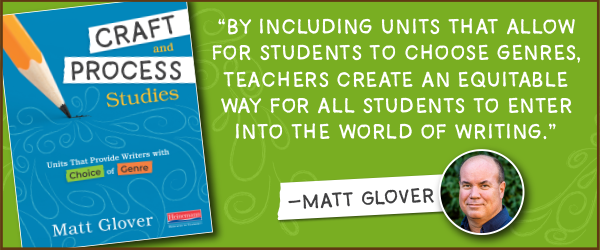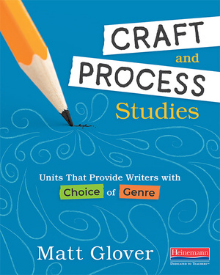
Blending Choice of Genre with Craft and Process Units
The below was adapted from Craft and Process Studies: Units That Provide Writers with Choice of Genre by Matt Glover.
In writing workshop, teaching tends to be organized into units of study that last three to six weeks. We organize our teaching this way so that we can work logically toward meaningful goals, responding directly to what we see students doing each day.
The word unit implies that we have goals we are working toward. But the word study is just as important. In a unit we are actively engaged in study, or inquiry, into how authors create things. While genre study is important, it isn’t the only type of study. Units can be organized around any big idea in writing that is worthy of study. A unit could be focused on a process authors use, an area of craft, or a genre.
Unfortunately, increasingly I’m in schools where students never have an opportunity to pursue writing in genres of their choice. A few years ago, I was working in a school district in Ohio that wanted to examine its children’s writing experiences from kindergarten through sixth grade. We tracked writing units from K to 6 on a grid so we could see them at a glance. The first thing we noticed as we studied the grid was that every unit of study, from the first day of kindergarten until the last day of sixth grade, was a genre study. This meant that students would go through seven years of school and over fifty units of study without once having the opportunity to choose their own genre. And in this school this also meant that they would never write fiction, since every story-writing unit was a personal narrative unit.
“[Students] sometimes choose genres that don’t necessarily fit neatly into a text type—but that do increase engagement, which is a baseline requirement for a successful and joyful writing life.”
As I work in schools across the United States and in international schools, I find this increasingly to be the norm. In my experience, this trend coincided with the adoption of new writing standards. Most standards ask students to write different types of texts, but not specific genres. For example, Common Core asks students each year to write in three text types: narrative, informational, and opinion/argument writing. Published programs often responded to these standards by creating units of study that are limited to genres that fit neatly within these text types.
When children have choice of genre, most of the genres they choose on their own do align with text types valued by standards. They sometimes choose genres that don’t necessarily fit neatly into a text type—but that do increase engagement, which is a baseline requirement for a successful and joyful writing life. To be clear, I’m not taking an anti-genre stance. I love genre study, especially studying genres that engage students. Genre study has significant benefits; the most important benefit is that students’ understanding about a particular genre—and about writing in general—grows when they study a specific genre in depth over an extended period of time, within the context of a unit of study.
I am also simply pro study. The thinking children do when they are studying an idea is very different from the thinking they do when they are simply given information. On the first day of a memoir study, there is a difference between saying, “Here are the two defining characteristics of memoir,” and, “Here is a stack of memoirs—let’s see what you notice about how they work.” In order to think deeply, children need time to deeply study both authors’ process and authors’ craft. I feel “free-choice” units that are not guided by a particular idea about writing are not very effective. I believe it’s important for teachers and students to know what in particular they are studying, whether it is process, craft, or study.
So, that said, Craft and Process Studies is not about units of study that turn children loose without support. This book’s biggest goal is to make a compelling case for the belief that choice of genre affects engagement for all writers and to offer support as you act on this belief by including in your year some writing units of study that allow for this choice.
- Matt Glover
To learn more about Craft and Process Studies visit Heinemann.com.
In Craft and Process Studies, Matt Glover offers 17 possible units that teach important writing skills while also providing opportunities for choice of genre. 40 classroom videos bring the content to life!
 Matt Glover has been a teacher, principal, and consultant for over 30 years. He is the author and co-author of many Heinemann titles including I Am Reading, Engaging Young Writers, Projecting Possibilities for Writers, Already Ready, and Watch Katie and Matt…Sit Down and Teach Up, a video- enhanced ebook. Matt was also co-editor with Ellin Oliver Keene of a best-selling collection of essays, The Teacher You Want to Be.
Matt Glover has been a teacher, principal, and consultant for over 30 years. He is the author and co-author of many Heinemann titles including I Am Reading, Engaging Young Writers, Projecting Possibilities for Writers, Already Ready, and Watch Katie and Matt…Sit Down and Teach Up, a video- enhanced ebook. Matt was also co-editor with Ellin Oliver Keene of a best-selling collection of essays, The Teacher You Want to Be.
An international literacy consultant, Matt frequently speaks on topics related to nurturing writers of all ages, early reading, and supporting children’s intellectual development.
Follow him on Twitter @Mattglover123





